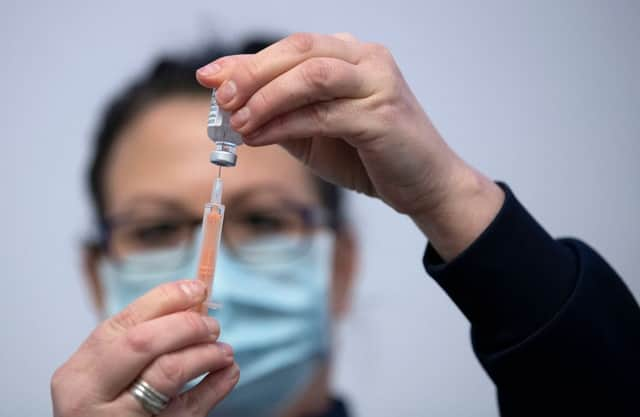All UK adults aged over 50 should get Covid jab by May - is it feasible?


All UK adults aged 50 and over should receive a Covid-19 vaccine by May, the government has announced.
Ministers had previously refused to give a firm date, saying only that the first nine priority groups would get their vaccination by the end of spring.
All nine priority groups by May
Advertisement
Hide AdAdvertisement
Hide AdWhile Downing Street repeatedly declined to define when spring ends during a press briefing on Thursday (4 February), the Cabinet Office later announced on Friday morning that the government intends to vaccinate all nine priority groups by May.
It said the vaccination programme planned to have reached all nine cohorts in the next four months, which would include all those aged 50 and over.
Around 27 million people in England, and 32 million people across the UK, are estimated to fall into the first nine groups.
The government is currently on track to vaccinate the first four cohorts by 15 February, including NHS and care home staff, care home residents, and all those aged 70 and over.
The nine priority groups include the following:
- Residents in a care home for older adults and their carers
- Everyone aged 80 and over, frontline health and social care workers
- People aged 75 and over
- Those aged 70 and over and the clinically extremely vulnerable
- People aged 65 and over
- People aged 16 to 64 with underlying health conditions
- People aged 60 and over
- People aged 55 and over
- People aged 50 and over
Advertisement
Hide AdAdvertisement
Hide AdPrioritisation for the rest of the UK population has yet to be determined.
Is it feasible?
So far more than 10.4 million people in the UK have now received their first dose of the jab, including nine in 10 people aged 75 and over in England.
Government data up to 3 February shows that of the 10,992,44 jabs given in the UK so far, 10,490,487 were first doses and 501,957 were second doses - a rise of 469,016 on the previous day’s figures. This means that just over half-a-million people are now fully vaccinated.
This is equivalent to vaccinating the total capacity of 111 Wembley stadiums in just eight weeks, and marks a significant step towards reaching the Prime Minister’s target of offering vaccines to the top four priority groups by mid-February.
Advertisement
Hide AdAdvertisement
Hide AdBased on the Vaccine Queue Calculator, people who are aged 50 are in group nine and have between 17,180,337 and 20,470,297 people ahead of them in the queue for a first dose of a Covid-19 vaccine.
Given a vaccination rate of 3,068,947 per week, and an uptake of 70.6 per cent, people in this group should expect to receive their first dose between 24 April and 9 May.
The second dose would then be expected between 17 July and 1 August.
At the moment, the government needs to meet an average of 409,956 vaccinations per day to reach its target of delivering 15 million first doses by 15 February.
Advertisement
Hide AdAdvertisement
Hide AdIf this rate is achieved and continues to be maintained, it is highly feasible that all nine priority groups - including the over 50s - will get their first jab by May.
Speaking about the progress so far, Health Secretary Matt Hancock said on Thursday (4 February): “We are on track to deliver the commitment we have made of offering the jab to all of the top four priority groups by February 15.
“I’m just so proud of the team who are delivering this, it’s going really, really well.
“You saw yesterday 10 million jabs done. Today we passed the threshold of one in five of the population who have been jabbed already.”
Advertisement
Hide AdAdvertisement
Hide AdThrough the government’s Vaccines Taskforce, the UK has secured early access to 407 million doses of seven of the most promising vaccine candidates, including:
- BioNTech/Pfizer for 40 million doses
- Oxford/AstraZeneca for 100 million doses
- Moderna for 17 million doses
- GlaxoSmithKline and Sanofi Pasteur for 60 million doses
- Novavax for 60 million doses
- Janssen for 30 million doses
- Valneva for 100 million doses
The vaccination programme continues to expand, with thousands of vaccination centres now open, ranging from GP and pharmacy-led services to hospitals and large-scale vaccination centres.